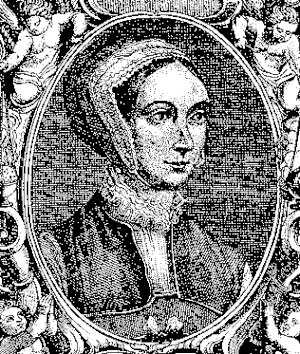Saints: August 2012 Archives
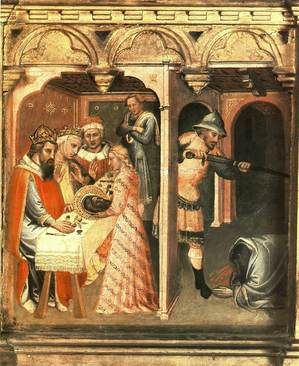 O God, who willed that Saint John the Baptist should
go ahead of your Son both in his birth and in his death, grant that, as he died
a Martyr for truth and justice, we, too, may fight hard for the confession of
what you teach.
O God, who willed that Saint John the Baptist should
go ahead of your Son both in his birth and in his death, grant that, as he died
a Martyr for truth and justice, we, too, may fight hard for the confession of
what you teach.

LET me speak of another celebrated conquest of God's grace in an after age, and you will see how it pleases Him to make a Confessor, a Saint, Doctor of His Church, out of sin and heresy both together. It was not enough that the Father of the Western Schools, the author of a thousand works, the triumphant controversialist, the especial champion of grace, should have been once a poor slave of the flesh, but he was the victim of a perverted intellect also. He who, of all others, was to extol the grace of God, was left more than others to experience the helplessness of nature. The great St Augustine (I am not speaking of the holy missionary of the same name, who came to England and converted our pagan forefathers, and became the first Archbishop of Canterbury, but of the great African Bishop, two centuries before him)--Augustine, I say, not being in earnest about his soul, not asking himself the question, how was sin to be washed away, but rather being desirous, while youth and strength lasted, to enjoy the flesh and the world, ambitious and sensual, judged of truth and falsehood by his private judgment and his private fancy; despised the Catholic Church because it spoke so much of faith and subjection, thought to make his own reason the measure of all things, and accordingly joined a far-spread sect, which affected to be philosophical and enlightened, to take large views of things, and to correct the vulgar, that is, the Catholic notions of God and Christ, of sin, and of the way to heaven. In this sect of his he remained for some years; yet what he was taught there did not satisfy him. It pleased him for a time, and then he found he had been eating for food what had no nourishment in it; he became hungry and thirsty after something more substantial, he knew not what; he despised himself for being a slave to the flesh, and he found his religion did not help him to overcome it; thus he understood that he had not gained the truth, and he cried out, "Oh, who will tell me where to seek it, and who will bring me into it?"
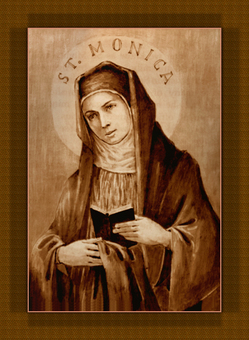 Everyone ought to have a "Saint Monica" figure in their lives. The sainted mother of Saint Augustine is the patron of spiritual maternity. Even though Monica was the biological mother of Augustine, she worked hard in the spiritual realm to get her son to give himself to Christ and his plan rather than his own plan of self-destructive behavior. Her constant prayer, fasting and good works all contributed to Augustine's conversion. The collect for today's Mass speaks volumes.
Everyone ought to have a "Saint Monica" figure in their lives. The sainted mother of Saint Augustine is the patron of spiritual maternity. Even though Monica was the biological mother of Augustine, she worked hard in the spiritual realm to get her son to give himself to Christ and his plan rather than his own plan of self-destructive behavior. Her constant prayer, fasting and good works all contributed to Augustine's conversion. The collect for today's Mass speaks volumes.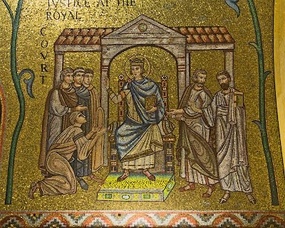 Saints come from all walks of life. We've got every group represented in the group of canonized. Today is the feast of a saint of a rare group --a king. The Church honors King Saint Louis IX.
Saints come from all walks of life. We've got every group represented in the group of canonized. Today is the feast of a saint of a rare group --a king. The Church honors King Saint Louis IX.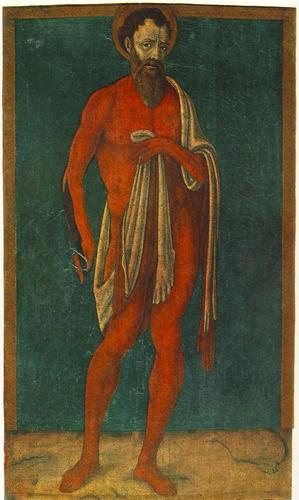
ST. BARTHOLOMEW, whose Festival we celebrate today, has been supposed to be the same as the Nathanael mentioned in the text. Nathanael was one of Christ's first converts, yet his name does not occur again till the last chapter of St. John's Gospel, where he is mentioned in company with certain of the Apostles, to whom Christ appeared after His resurrection. Now, why should the call of Nathanael have been recorded in the opening of the Gospel, among the acts of Christ in the beginning of His Ministry, unless he was an Apostle? Philip, Peter, and Andrew, who are mentioned at the same time, were all Apostles; and Nathanael's name is introduced without preface, as if familiar to a Christian reader. At the end of the Gospel it appears again, and there too among Apostles. Besides, the Apostles were the special witnesses of Christ, when He was risen. He manifested Himself, "not to all the people," says Peter, "but unto witnesses chosen before of God, even to us, who did eat and drink with Him after He rose from the dead." [Acts x. 41.] Now, the occasion on which Nathanael is mentioned, was one of these manifestations. "This is now the third time," says the Evangelist, "that Jesus was manifested to His disciples, after that He was risen from the dead." It was in the presence of Nathanael, that He gave St. Peter his commission, and foretold his martyrdom, and the prolonged life of St. John. All this leads us to conjecture that Nathanael is one of the Apostles under another name. Now, he is not Andrew, Peter, or Philip, for they are mentioned in connexion with him in the first chapter of the Gospel; nor Thomas, James, or John, in whose company he is found in the last chapter; nor Jude (as it would seem), because the name of Jude occurs in St. John's fourteenth chapter. Four Apostles remain, who are not named in his Gospel,--St. James the Less, St. Matthew, St. Simon, and St. Bartholomew; of whom St. Matthew's second name is known to have been Levi, while St. James, being related, was not at any time a stranger to our Lord, which Nathanael evidently was. If then Nathanael were an Apostle, he was either Simon or Bartholomew. Now it is observable, that, according to St. John, Philip brought Nathanael to Christ; therefore Nathanael and Philip were friends: while in the other Gospels, in the list of Apostles, Philip is associated with Bartholomew; "Simon and Andrew, James and John, Philip and Bartholomew." [Matt. x. 3.] This is some evidence that Bartholomew and not Simon is the Nathanael of St. John. On the other hand, Matthias has been suggested instead of either, his name meaning nearly the same as Nathanael in the original language. However, since writers of some date decide in favour of Bartholomew, I shall do the like in what follows.
What then do we learn from his recorded character and history? It affords us an instructive lesson.
When
Philip told him that he had found the long-expected Messiah of whom Moses
wrote, Nathanael (that is, Bartholomew) at first doubted. He was well read in
the Scriptures, and knew the Christ was to be born in Bethlehem; whereas Jesus
dwelt at Nazareth, which Nathanael supposed in consequence to be the place of
His birth,--and he knew of no particular promises attached to that city, which
was a place of evil report, and he thought no good could come out of it. Philip
told him to come and see; and he went to see, as a humble single-minded man,
sincerely desirous to get at the truth. In consequence, he was vouchsafed an
interview with our Saviour, and was converted.
Plain and Parochial Sermons, 27
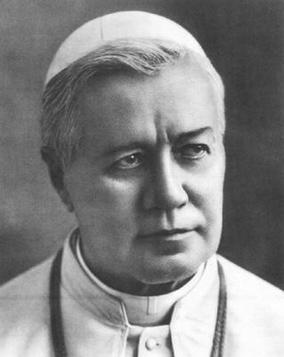 O God, who to safeguard the Catholic faith and to
restore all things in Christ, filled Pope Saint Pius the Tenth with heavenly
wisdom and apostolic fortitude, graciously grant that, following his teaching
and example, we may gain an eternal prize.
O God, who to safeguard the Catholic faith and to
restore all things in Christ, filled Pope Saint Pius the Tenth with heavenly
wisdom and apostolic fortitude, graciously grant that, following his teaching
and example, we may gain an eternal prize.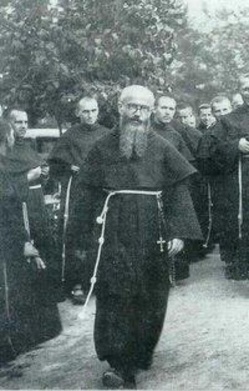 Come, you blessed of my Father, says the Lord. Amen I say to you: Whatever you did for one of the least of my brethren, you did it for me.
Come, you blessed of my Father, says the Lord. Amen I say to you: Whatever you did for one of the least of my brethren, you did it for me.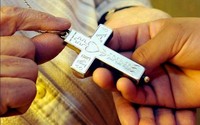
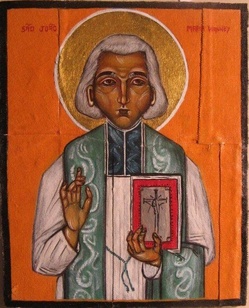
Almighty and merciful God, who made the Priest Saint John Vianney wonderful in his pastoral zeal, grant, we pray, that through his intercession and example we may in charity win brothers and sisters for Christ and attain with them eternal glory.
The August liturgical memorial for Saint John Marie Vianney, the patron of priests, is yet another reminder we ought to have in interceding on behalf of priests. God needs to hear from us n this subject...
May Saint John Vianney approach the Throne of Mercy for all priests.
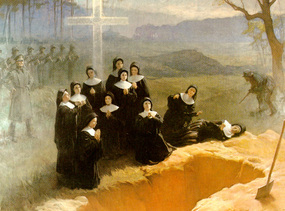 This picture of the Blessed Martyrs of Nowogródek has been imprinted in my mind and heart since I was in grammar school with the Sisters of the Holy Family of Nazareth. How could one be not moved by the death of these women?
This picture of the Blessed Martyrs of Nowogródek has been imprinted in my mind and heart since I was in grammar school with the Sisters of the Holy Family of Nazareth. How could one be not moved by the death of these women?